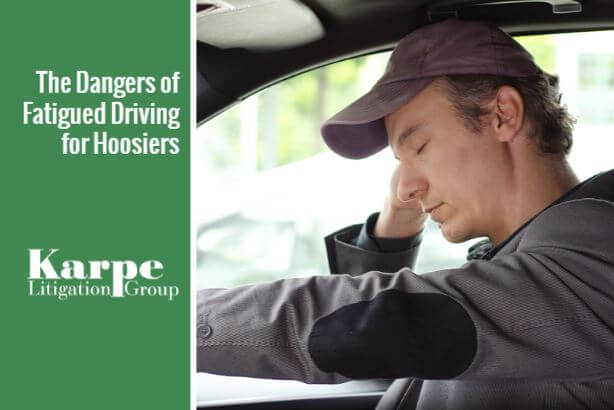
Do you know that driving while drowsy or fatigued is just as dangerous as drinking and driving? Find out why fatigued driving or falling asleep at the wheel accounts for 29.3% of serious injury collisions in Indiana a year -those with at least one fatal or incapacitating injury.
If you are like most Americans, you don’t get enough sleep. A quick cup of morning coffee and you are out on the road, along with hundreds of other sleepy motorists. This scenario is putting you (and the drivers around you) in a dangerous situation each and every day.
The National Highway Traffic Safety Administration estimates that each year, over 100,000 police-reported crashes involve drowsy driving. In 2015 alone, an estimated 5,000 people died in crashes where drowsy driving is the culprit, according to a Governors Highway Safety Association (GHSA) report.
We know fatigued driving affects everyone on the road, both drivers and passengers. In Indiana, drowsy driving is classified as impaired driving, which falls under the greater umbrella of distracted driving, accounting for the largest percentage of the majority of accidents and injuries each year.
A recent report examining Hoosier driving behavior notes that drivers’ unsafe actions are the primary cause of crashes, resulting in 111,298 accidents. Indiana State Police finds fatigued driving or falling asleep at the wheel accounts for 29.3% of these serious injury collisions -those with at least one fatal or incapacitating injury.
Why Drowsy Driving Is Impaired Driving
GHSA research shows nearly 83.6 million people are sleep deprived in the workplace, at school and on the road. Why is drowsy driving considered impaired driving? Consider this:
- fatigue slows reaction time
- drowsiness impairs situational awareness and judgment
- fatigue increases risk-taking and lapses of attention
- driving while drowsy or fatigued is just as dangerous as drinking and driving
We regularly see how all of these factors have extremely detrimental effects on the driver’s ability to control a vehicle, accounting for more than 71,000 injuries each year. According to the National Safety Council, fatigue-related crashes involving fatalities or injuries cost society $109 billion each year.
Drowsy Driving and Indiana Law
In Indiana, laws intended to discourage drowsy driving generally concentrate on the connection between fatigued driving and alcohol consumption. These measures have saved lives and money in Indianapolis and the surrounding areas.
- Administrative License Revocation - These laws allow police and driver license authorities to automatically revoke a person’s license for refusing or failing a BAC test (blood alcohol test).
- Zero Tolerance Laws - In Indiana, it is illegal for individuals under the age of 21 to drive with a positive BAC. It is estimated that these laws have reduced impaired-driving fatalities by 4%.
- .08 BAC Law - By lowering the BAC limit to .08, impaired driving fatalities have reduced by 7%.
- Graduated Licensing - Young drivers must demonstrate responsible driving habits to advance between the three-stage licensing program from a learner’s permit, to an intermediate or provisional license, to full licensure.
Drivers More Likely To Be Fatigued
A majority of drowsy drivers fall into a short list of categories. These include:
- Drivers who do not get enough sleep
- Commercial drivers who operate vehicles such as semi-trucks, tow trucks and buses
- Shift workers, especially those working a night shift or swing shift
- Drivers with sleep disorders, such as sleep apnea
- Drivers who use medications that treat sleeplessness or insomnia
Be Aware of the Warning Signs of Fatigued Driving
If you are experiencing any of these signs, it is crucial that you get off the road and stop driving:
- Yawning or blinking frequently
- Difficulty remembering the past few miles driven
- Missing your exit
- Drifting from your lane
- Hitting a rumble strip on the side of the road
- Falling asleep, even for a moment
Take Step to Dodge Drowsy Driving
The best way to ensure that you are not the cause of a drowsy driving accident is to avoid driving drowsy in the first place. The National Highway Traffic Safety Administration offers this advice:
- The only true way to avoid drowsy driving is to get enough sleep. Experts urge the public to get at least seven to eight hours of sleep each night.
- Make sure to get a good night’s sleep before getting behind the wheel for a long car trip.= or any kind.
- Teenagers are especially vulnerable to drowsy driving as they typically don’t get enough sleep at a time when they biologically need more sleep than adults. Encourage your teens to get enough sleep before operating a vehicle.
- Do not drink alcohol before driving. Alcohol increases drowsiness and impairs motor coordination.
- Read your prescription labels. Most labels include information on whether or not the medication can cause drowsiness.
- Try to avoid the peak fatigue times of midnight to 6:00 am and late afternoon.
Interventions for Drowsy Driving
While everyone should follow steps to avoid drowsy driving, it is also necessary to put interventions in place. We know this is especially true for male drivers under the age of 25, who make up an estimated 50% of drowsy driving crashes. Initiatives to consider:
- Crash avoidance technologies - Safety technologies, both existing and planned, include drowsiness alert and lane departure warnings. These technologies can detect patterns of drowsy driving and warn drivers to stay in their lane or take a break.
- University interventions - As college students represent a major portion of the under 25 driving demographic, education programs created for students may help raise awareness of drowsy driving issues. College students receive less sleep with some estimates at less than six hours a night. Educating these students now helps build better behaviors that will last into adulthood.
- Workplace education - Employers with strong health and safety programs, both on and off the job, can contribute to employees getting sufficient information on the dangers of fatigued driving.
Personal Attention from Professional Attorneys
If you believe you or a loved one has been the victim of a drowsy driving accident, talk to the professional attorneys at Karpe Litigation Group today. We are experts in auto accident law, winning the most challenging cases and helping those in need for 20 years and counting. There is no fee until we win for you. Committed to making things easy for you, we are happy to meet by appointment on evenings and weekends, and travel to you when needed. Give us a call today at 1-888-228-7800 or fill out our contact form to schedule your free initial consultation.




